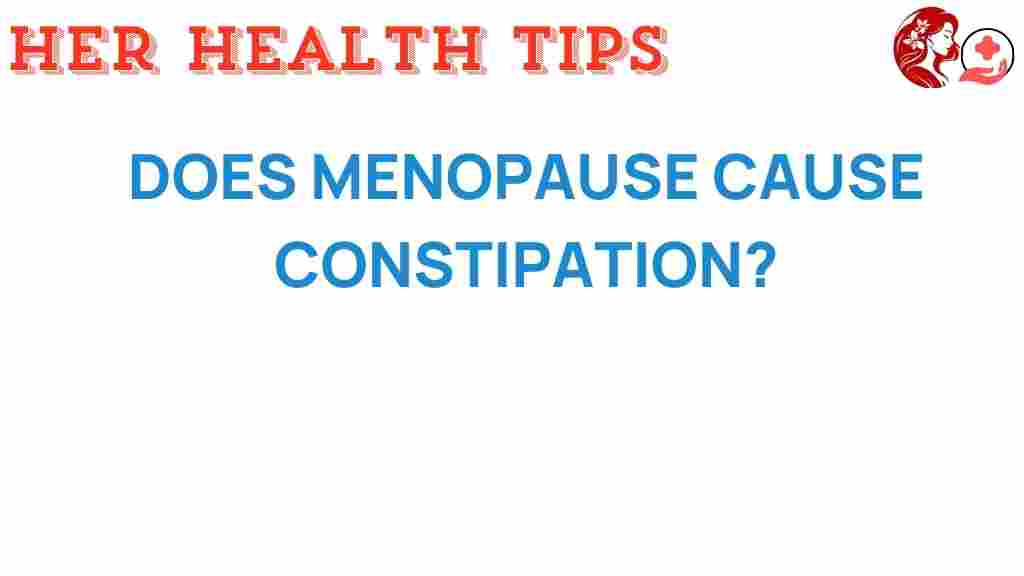Unraveling the Connection: Does Menopause Cause Constipation?
Menopause is a natural biological process that marks the end of a woman’s reproductive years. While this transition is often associated with various symptoms such as hot flashes, mood swings, and sleep disturbances, many women also experience less-discussed issues, including constipation. Understanding the connection between menopause and constipation is crucial for maintaining digestive health and overall wellness during this significant life change.
The Impact of Hormonal Changes on Digestive Health
During menopause, a woman’s body undergoes significant hormonal changes, primarily a decrease in estrogen and progesterone levels. These hormonal fluctuations can have a profound effect on various bodily systems, including the gastrointestinal (GI) tract. Estrogen plays a vital role in regulating digestive function, and as its levels decline, women may experience various gastrointestinal issues, including constipation.
How Menopause Affects Constipation
Several factors contribute to constipation during menopause:
- Decreased Estrogen: Lower levels of estrogen can lead to slowed intestinal motility, making it more challenging for the digestive system to process food efficiently.
- Changes in Diet: Many women alter their diets during menopause, sometimes reducing fiber intake, which is essential for maintaining regular bowel movements.
- Physical Activity: Some women may become less active during menopause, contributing to slower digestion and constipation.
- Stress and Anxiety: Hormonal changes can increase stress levels, which can negatively impact digestive health and lead to constipation.
Recognizing Symptoms of Constipation
Constipation can manifest in several ways. Women experiencing menopause should be aware of the following symptoms:
- Infrequent bowel movements (less than three times a week)
- Hard or lumpy stools
- Straining during bowel movements
- Feeling of incomplete evacuation
- Bloating or abdominal discomfort
If you notice these symptoms, it’s important to take action to address them. Chronic constipation can lead to further gastrointestinal issues and negatively impact overall health.
Step-by-Step Process to Manage Constipation During Menopause
Managing constipation effectively involves a combination of dietary changes, lifestyle adjustments, and self-care strategies. Here’s a step-by-step process to improve your digestive health during menopause:
1. Increase Fiber Intake
A diet rich in fiber is essential for maintaining regular bowel movements. Aim for at least 25 grams of fiber per day by incorporating the following foods:
- Fruits (berries, apples, pears)
- Vegetables (broccoli, carrots, leafy greens)
- Whole grains (brown rice, whole wheat bread, oats)
- Legumes (beans, lentils, chickpeas)
2. Stay Hydrated
Dehydration can exacerbate constipation. Ensure you drink plenty of water throughout the day, aiming for at least 8-10 cups. Herbal teas and broths can also contribute to your daily fluid intake.
3. Regular Physical Activity
Engaging in regular exercise can stimulate intestinal activity and improve digestive health. Aim for at least 30 minutes of moderate exercise most days of the week. Consider activities such as:
- Walking
- Swimming
- Yoga
- Strength training
4. Manage Stress
Stress can significantly impact digestion. Incorporate stress-reduction techniques into your routine, such as:
- Meditation
- Deep breathing exercises
- Mindfulness practices
- Regular downtime and relaxation
5. Monitor Medications
Some medications can contribute to constipation. If you’re experiencing digestive issues, consult with your healthcare provider regarding your current medications. They may suggest alternatives or adjust dosages to alleviate symptoms.
6. Consider Probiotics
Probiotics can be beneficial for digestive health. These live microorganisms can help balance gut bacteria and improve bowel regularity. Look for probiotic-rich foods like yogurt, kefir, sauerkraut, and kombucha, or consider a probiotic supplement after consulting with a healthcare professional.
7. Schedule Regular Bathroom Breaks
Establish a routine for bathroom breaks to encourage regular bowel movements. Responding promptly to the urge to go can help prevent constipation.
8. Consult a Healthcare Professional
If constipation persists despite making lifestyle changes, it may be time to consult a healthcare professional. They can evaluate your symptoms and recommend appropriate treatments or therapies tailored to your needs.
Troubleshooting Tips for Managing Constipation
If you find yourself struggling with constipation during menopause, consider these troubleshooting tips:
1. Assess Your Diet
Take a closer look at your diet. Are you getting enough fiber? Are you consuming enough fluids? Keeping a food diary can help identify patterns contributing to your symptoms.
2. Evaluate Physical Activity Levels
Make sure you’re incorporating physical activity into your daily routine. If you have a sedentary lifestyle, consider small changes like taking the stairs instead of the elevator or going for short walks during breaks.
3. Track Your Symptoms
Keep a record of your bowel movements and any accompanying symptoms. This information can be valuable when discussing your condition with a healthcare provider.
4. Stay Informed
Educate yourself about menopause and its effects on your body. Understanding the changes can empower you to make informed decisions about your health.
5. Join Support Groups
Connecting with other women experiencing similar challenges can provide emotional support and practical advice. Consider joining a local or online support group focused on menopause and women’s wellness.
Conclusion
In conclusion, while menopause can lead to various symptoms, including constipation, understanding the connection between hormonal changes and digestive health is vital for managing these issues effectively. By adopting a proactive approach that includes dietary changes, enhanced physical activity, and stress management techniques, women can significantly improve their digestive health during this transitional phase of life.
If you are struggling with constipation or other gastrointestinal issues during menopause, it’s important to consult with a healthcare professional for personalized advice and treatment options. Remember, maintaining digestive health is an essential aspect of overall women’s wellness during menopause.
For more information on menopause and women’s health, you can visit WomensHealth.gov.
To learn more about digestive health and managing constipation, check out our guide here.
This article is in the category Conditions and created by HerHealthTips Team
